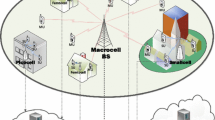Abstract
In this paper, we consider the problem of traffic offloading in a two-tier downlink smallcell network with hybrid access. We formulate a Stackelberg game with pre-offloading decision, which includes two steps, to study the problem. The utility of the MBS is designed as a piecewise function, corresponding to the two possible decisions of the MBS. We design a bonus-based incentive mechanism to motivate smallcell base stations (SBSs) serve the MUEs. We prove the existence and uniqueness of the Stackelberg equilibrium. We also consider the incomplete information game, where the SBSs have private information. A Bayesian Stackelberg game with pre-offloading decision is formulated and the existence of Bayesian Stackelberg equilibrium is proved. Our proposed approach achieves much higher utilities than the existing approach does under some circumstances in both cases, which proves the necessity and superiority of our proposed game structure.








Similar content being viewed by others
References
Roche, G., Valcarce, A., Perez, D., et al. (2010). Access control mechanisms for femtocells. IEEE Communications Magazine, 48(1), 33–39.
Chandrasekhar, V., & Andrews, J. (2008). Femtocell networks: a survey. IEEE Communications Magazine, 46(9), 59–67.
Zhang, Z., Zhang, H., & Zhao, Z., et al. (2013). Low complexity energy-efficient resource allocation in down-link dense femtocell networks. In Proceedings of IEEE PIMRC (pp. 1650–1654).
Ma, W., Zhang, H., & Zheng, W. et al. (2012). Differentiated-pricing based power allocation in dense femtocell networks. In Proceedings of IEEE WPMC (pp. 599–603).
Perez, D., Valcarce, A., Roche, G., et al. (2009). OFDMA femtocells: a roadmap on interference avoidance. IEEE Communications Magazine, 47(9), 41–48.
Zhu, K., Hossain, E., & Niyato, D. (2014). Pricing, spectrum sharing, and service selection in two-tier small cell networks: a hierarchical dynamic game approach. IEEE Transactions on Mobile Computing, 13(8), 1843–1856.
Chen, Y., Zhang, J., & Zhang, Q. (2012). Utility-aware refunding framework for hybrid access femtocell network. IEEE Transactions on Wireless Communications, 11(5), 1688–1697.
Hamouda, S., Zitoun, M., & Tabbane, S. (2014). Win-win relationship between macrocell and femtocells for spectrum sharing in LTE-A. IET Communications, 8(7), 1109–1116.
Zhang, H., Jiang, C., Beaulieu, N. C., et al. (2014). Resource allocation in spectrum-sharing OFDMA femtocells with heterogeneous services. IEEE Transactions on Communications, 62(7), 2366–2377.
Nguyen, D., & Le-Ngoc, T. (2014). Sum-rate maximization in the multicell MIMO multiple-access channel with interference coordination. IEEE Transactions on Wireless Communications, 13(1), 36–48.
Tan, C. W., Friedland, S., & Low, S. H. (2011). Nonnegative matrix inequalities and their application to nonconvex power control optimization. SIAM Journal on Matrix Analysis and Applications, 32(3), 1030–1055.
Myerson, R. (1991). Game theory: Analysis of conflict. Cambridge, MA: Harvard University Press.
Niyato, D., & Hossain, E. (2008). Competitive spectrum sharing in cognitive radio networks: a dynamic game approach. IEEE Transactions on Wireless Communications, 7(7), 2651–2660.
Niyato, D., Hossain, E., & Han, Z. (2009). Dynamics of multiple-seller and multiple-buyer spectrum trading in cognitive radio networks: a gametheoretic modeling approach. IEEE Transactions on Mobile Computing, 8(8), 1009–1022.
Chen, C., Wang, C., Chao, S., et al. (2010). DANCE: a game-theoretical femtocell channel exchange mechanism. ACM SIGMOBILE Mobile Computing and Communications Review, 14(1), 13–15.
Kang, X., & Zhang, R. (2012). Price-based resource allocation for spectrum-sharing femtocell networks: a Stackelberg game approach. IEEE Journal on Selected Areas in Communications, 30(3), 538–549.
Yi, C., & Jun, C. (2014). Two-stage spectrum sharing with combinatorial auction and Stackelberg game in recall-based cognitive radio networks. IEEE Transactions on Communications, 62(11), 3740–3752.
Guruacharya, S., Niyato, D., Kim, D., et al. (2013). Hierarchical competition for downlink power allocation in OFDMA femtocell networks. IEEE Transactions on Wireless Communications, 12(4), 1543–1553.
Zhu, K., Hossain, E., & Anpalagan, A. (2015). Downlink power control in two-tier cellular OFDMA networks under uncertainties: a robust Stackelberg game. IEEE Transactions on Communications, 63(2), 520–535.
Han, Q., Yang, B., Wang, X., et al. (2014). Hierarchical-game-based uplink power control in femtocell networks. IEEE Transactions on Vehicular Technology, 63(6), 2819–2835.
Parsaeefard, S., Sharafat, A., & Schaar, M. (2014). Robust additively coupled games in the presence of bounded uncertainty in communication networks. IEEE Transactions on Vehicular Technology, 63(3), 1436–1451.
Bu, S., Yu, F., Cai, Y., et al. (2014). Interference-aware energy-efficient resource allocation for OFDMA-based heterogeneous networks with incomplete channel state information. IEEE Transactions on Vehicular Technology, 64(3), 1036–1050.
LeAnh, T., Tran, N.H., & Kazmi, S.M. et al. (2015). Joint pricing and power allocation for uplink macrocell and femtocell cooperation. In Proceedings of IEEE ICOIN (pp. 171–176).
Kang, X., Liang, Y.-C., & Garg, H.K. (2011). Distributed power control for spectrum-sharing femtocell networks using stackelberg game. In Proceedings of IEEE ICC (pp. 1–5).
Rosen, J. B. (1965). Existence and uniqueness of equilibrium points for concave N-person games. Ecnometrica, 33(3), 520–534.
Duong, N., Madhukumar, A., Niyato, D. (2016). Stackelberg Bayesian Game for power allocation in two-tier networks. IEEE Transactions on Vehicular Technology, 65(4), 2341–2354.
Akkarajitsakul, K., Hossain, E., & Niyato, D. (2011). Distributed resource allocation in wireless networks under uncertainty and application of Bayesian game. IEEE Communications Magazine, 49, 120–127.
Author information
Authors and Affiliations
Corresponding author
Rights and permissions
About this article
Cite this article
Yao, K., Sun, Y., Zhang, Z. et al. When to offload in two-tier smallcell networks: a Stackelberg game approach with pre-offloading-decision. Wireless Netw 23, 2499–2508 (2017). https://doi.org/10.1007/s11276-016-1303-2
Published:
Issue Date:
DOI: https://doi.org/10.1007/s11276-016-1303-2




